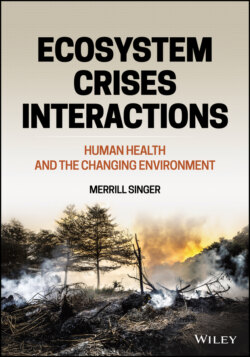Читать книгу Ecosystem Crises Interactions - Merrill Singer - Страница 21
1.7 Thresholds in the environment
ОглавлениеLike pollution, other forms of anthropogenic environment disruption are not inevitable, unavoidable, or too costly to avoid. The full costs of pollution and disruption are manifest in ecocrises interactions. Critical to the development of many ecocrises interactions is the crossing of the thresholds of planetary boundaries. Environmental conditions are defined as intrinsic features at local, regional, or global scales that constitute positions along one or more control variables, such as temperature and the albedo (solar reflection) feedback pathway involving floating sea ice. Icebergs in the ocean, being lighter in color than the surrounding water, reflect more solar radiation. Consequently, the significant rate at which sea ice is melting—a phenomenon driven by planetary warming—represents a negative feedback loop that feeds further warming. Once the volume of sea ice threshold is passed, environmental degradation will continue even without further human input, reducing the possibility for mitigation. Staying within such thresholds, as a result, is critical for human well‐being and the well‐being of the other lifeforms we depend upon and with which we share this planet.
On July 28, 2000, the U.N. Economic and Social Council established the Permanent Forum on Indigenous Issues to discuss and advise on issues facing indigenous peoples of the world related to social development, culture, environment, education, health, and human rights. Nine years later, on May 27, 2009, during the eighth meeting of the Permanent Forum in New York, one of the speakers was Nicolas Lucas Ticum, a priest and researcher from Guatemala of Maya ancestry. In seeking to reframe the human/environment relationship, Ticum stated: “All of humanity must work together to re‐establish harmony and unity with the natural environment … The Earth does not belong to human beings. Human beings belong to the Earth” (Economic and Social Council 2009). The alternative is ever more devastating anthropogenic ecocrises.
